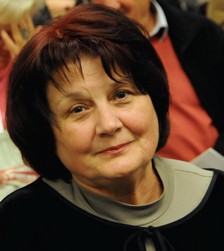
Svetlana Maksimović, composer and pedagogue. For a number of years, she taught harmony, counterpoint, and composition (at Stanković School of Music in Belgrade and in Toronto, where she lived for 12 years). In February 2006, she acquired a doctoral degree in composition from the University of Toronto, with an orchestra piece, Four Museum Rooms. The piece was made as a result of her research in ancient musical traditions and ‘the scales as a concept’, as much as the sources would allow it. It was premièred in Belgrade, in April this year. At an earlier stage, as her final BA project (in the class of Vasilije Mokranjac), she wrote Skica za orkestar (Sketch for Orchestra), a piece where ‘sound quality’ was the guiding idea and principle of composition (density, paucity, fluidity, lighter and darker tonal layers).
In Canada, she had a large number of commissions – from contemporary music festivals and jubilees (Light Approaching, presented in a conversation with the author on Two New Hours on CBC Radio 2, as a notable new piece). Most of Maksimović’s oeuvre comprises chamber instrumental music, while vocal writing is rare in her opus and when it appears, it is integrated in the texture in particular ways (Skica za orkestar features a soprano line with no text, Na Sv. Nikolu / On St. Nicholas Day features a soprano and baritone singing parts of stichera, and now in the present piece, O mističnoj ljubavi / Of Mystical Love).
The piece Of Mystical Love for mezzo-soprano is a setting of several verses by Rumi. Reading and listening to ‘poetry’ (writings on the meaning of life and love) by Jalāl ad-Dīn Muhammad Rūmī, a Persian mystic and thinker from the 13th century and the founder of the ‘Sufi order’ leaves a multilayered impression. It encompasses theology, philosophy, theosophy, ecstatic states, and searching for the reason why being comes to life and then leaves it. Rumi often presents various graded states, from hoping and anticipating, longing for and realising, to losing love. These perceptions of love, divine as well as human, are part of the eternal and the temporal. From the ocean of thoughts felt and feelings thought there surfaces the desire for the unity of being, one – complete, or two in one! After much reading, music began flowing from my accumulated impressions and I chose the shortest possible utterance, in three lines. The words in the vocal line serve only to guide the music.


